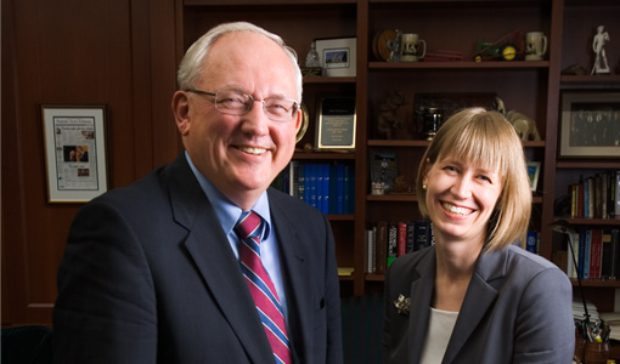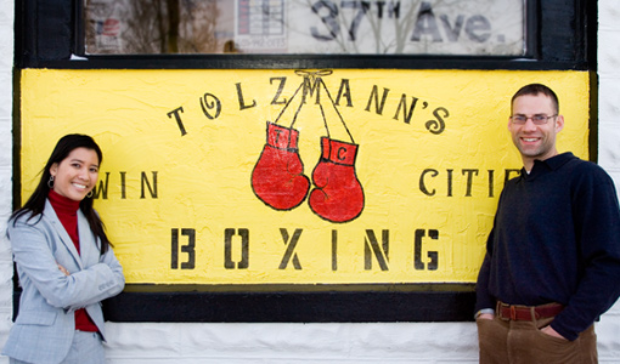By the end of Andrea Specht’s clerkship with Associate Justice Paul H. Anderson of the Minnesota Supreme Court, it was hard to believe they had been working together only a year. Specht and Anderson finished each other’s thoughts, ribbed each other playfully, and corrected and cajoled each other in a way that suggested a longtime partnership.
“It is the type of rapport that you can only have with someone in whom you have complete confidence, and they know you have complete confidence in them,” Anderson said. “I want my clerks to become my independent counsel.” Specht became exactly that.
The professional relationship between Anderson and Specht demonstrates that the path from new graduate to legal professional is about more than passing the bar exam, gaining employment and delivering technical skills. A successful lawyer goes beyond the job description and works to build great relationships.
A judicial clerkship offers recent graduates the opportunity to develop professional confidence and high-level research and writing skills and to gain experience with, and insight into, the administration of justice. For Specht, the combination proved significant.
Specht initially believed that the clerkship would essentially be a postgraduate year spent as a research assistant. But she quickly moved beyond the basics of the job’s research and writing accountabilities and found herself with a voice – fully integrated in the judicial process, while advancing her professional development under the guidance of one of the state’s most espected jurists. “Being taken seriously as an attorney was a really rewarding experience,” Specht said.
“Good lawyers need to be able to enter the dialogue and carry their weight at the table,” Anderson commented. To be effective as a clerk and lawyer means stretching the boundaries of one’s thinking and looking at all sides of an issue. In the clerkship setting, this can mean thinking about solutions out loud. “This has to happen in an environment where it is all right to make mistakes,” Anderson said, adding that searching for a solution is like walking down a hallway and trying every door. The hallway surrounding his chambers makes a powerful analogy as the hallway is circular and one never knows how many doors are ahead. “You try every door,” Anderson said. “Some look like they might work, and then open onto a 50-foot cliff, but you have to try every door.” Anderson was quick to point out that “trying every door” also is key when working in front of the court; a well-prepared lawyer will have thought through all the potential solutions well enough to know which solutions will not work and why.
Specht found this exploration of all potential solutions to be a rewarding part of the clerkship, and one that helped her recognize herself as a legal professional. “People are asking for your opinion and you have to articulate and support it,” Specht said, emphasizing that it’s especially important to be able to explain the process by which you came to a point of view. “It’s great to contribute to a complex discussion and feel like you added something of substance.”
While she identified the development of research, writing and analytical skills as some of the greatest professional rewards of her clerkship, Specht, like Anderson, believes that there are other vital things that factor into moving from law student to lawyer. “Having knowledge of the law is not enough,” Specht said, referring to what it takes to be successful in the highly competitive legal field.
That there is a broader purpose to the law is a value emphasized throughout the clerkship experience. Anderson imparts this value to clerks by taking them to a range of events, including meetings with county attorneys and public defenders, where clerks often are surprised to learn about the impact that each case carries. Anderson is quick to point out that the court is not primarily interested in the lawyer winning or losing a particular case, and sometimes this is a disconnect with the lawyer.
Anderson points out, “We are a court of policy and doctrine.” Anderson and Specht often talked about the broader themes during the year she spent at the court. The closer Specht came to the application of law in the real world, the more she realized that the American system of justice is necessarily an imperfect one. Specht took comfort in knowing that the lawyers, judges and other participants in the system are largely good and intelligent people striving to make positive changes in the lives of others. Anderson and his clerks build the majority of their workdays around writing memoranda and opinions; however, Specht showed her natural curiosity as she and Anderson discussed current affairs at the local, national and international level. Both looked forward to these discussions as opportunities to test each other’s intellect and knowledge.
Humor is not lost in the weighty proceedings of Anderson’s chambers, and in the appropriate moment it can strengthen the working relationship. Specht, after learning that Anderson had a keen sense of humor, captured a moment. After receiving a long, verbal to-do list from Anderson, she asked simply, “Would you like fries with that?” Anderson’s belly laugh confirmed that he appreciated Specht’s humor as a way to bring some fun into a demanding, and sometimes stressful, work environment.
A successful clerkship will advance significantly a lawyer’s writing skills. “In our English common law system we write to test the soundness of our reasoning,” Anderson said. It is not uncommon for him to require more than 20 drafts before sending an opinion forward. Both the justices and the clerks agree that the first three months of a clerkship are particularly difficult for this reason. Mistakes are not tolerated, but as time passes clerks begin to see that if the legal interpretation is ambiguous, a jurist has failed in his or her responsibilities to the community. Anderson goes out of his way to provide clerks with evidence of this by taking them to visit legal professionals who dissect the work of the court.
The standard for clarity is high, and there are no shortcuts. “A lot of muddled thinking gets camouflaged in poor writing,” Anderson said. His exacting standards apply not only to the clerks, but to himself. Current clerk Matt Berger, also a University of St. Thomas School of Law alumnus, was asked to evaluate an opinion during his first 10 days. Anderson wanted him to ask hard questions and look for the flaws. Just a few days into the clerkship Anderson appeared pleased that Berger had been able to find some flaws and even suggest ways to address them.
Anderson keeps a small statue of Michelangelo in his office to remind him of the artistic elements of written work, which he believes emerge toward the end of the writing process. “It is not enough to be structurally sound,” he said. “You have to deal with the nuances of communication.” Those nuances require hours of intellectually rigorous work; however, judicial opinions demand the investment of time and care.
In talking about what made Anderson and Specht’s partnership so successful, Anderson has a lot to say to the next generation of law students hoping to become clerks. “I want to work with someone who has explored the nooks and crannies of life.” Evidence of academic achievement is critical, and a good indicator of success, he said, but he also seeks people who have led interesting lives and have demonstrated a commitment to the community. He also looks for people he can connect with personally.
Specht’s application caught Anderson’s eye. She had outstanding academic credentials, had worked professionally between college and law school, and had shown a commitment to nonprofit and social organizations. Following Specht’s interview, Anderson knew they were on the path to a great rapport. Specht attributes the interpersonal connectivity to three critical characteristics of a successful judicial clerk: the ability to listen well, a healthy sense of humor and intellectual curiosity.
At the top of the list was Specht’s ability to be a good listener and demonstrate genuine interest in what the justice had to say. Anderson is a self-described story teller, and he wants his clerks to gain knowledge about who he is and how he thinks through the story. Anderson also believes the increased understanding and knowledge gained through story telling facilitates a better working relationship.
While there have been many lessons learned along the way, one of the things that both Specht and Anderson truly seem to cherish is their enduring friendship and the prospect of staying in contact for many years to come. They soon will co-write an article for the William Mitchell Law Review, and Specht knows she will rely on Anderson as a key adviser as she contemplates future decisions in her legal career and community service endeavors.
Read more from St. Thomas Lawyer.





